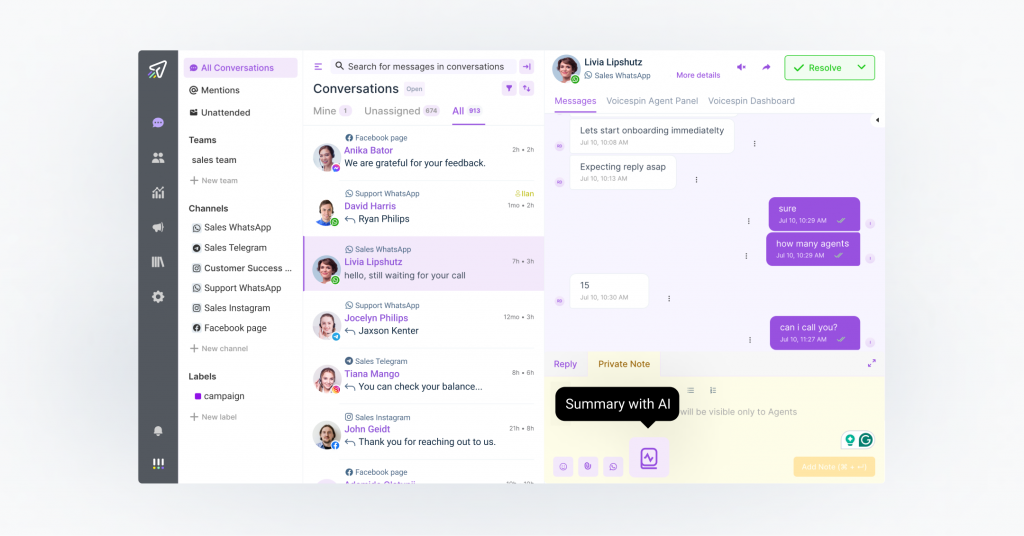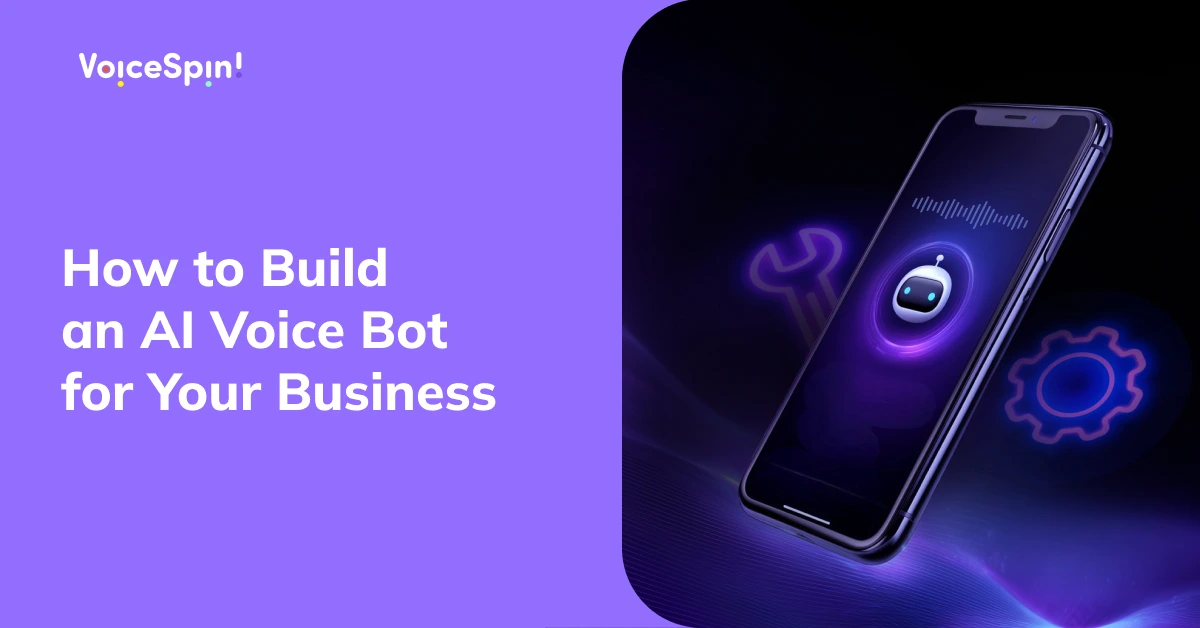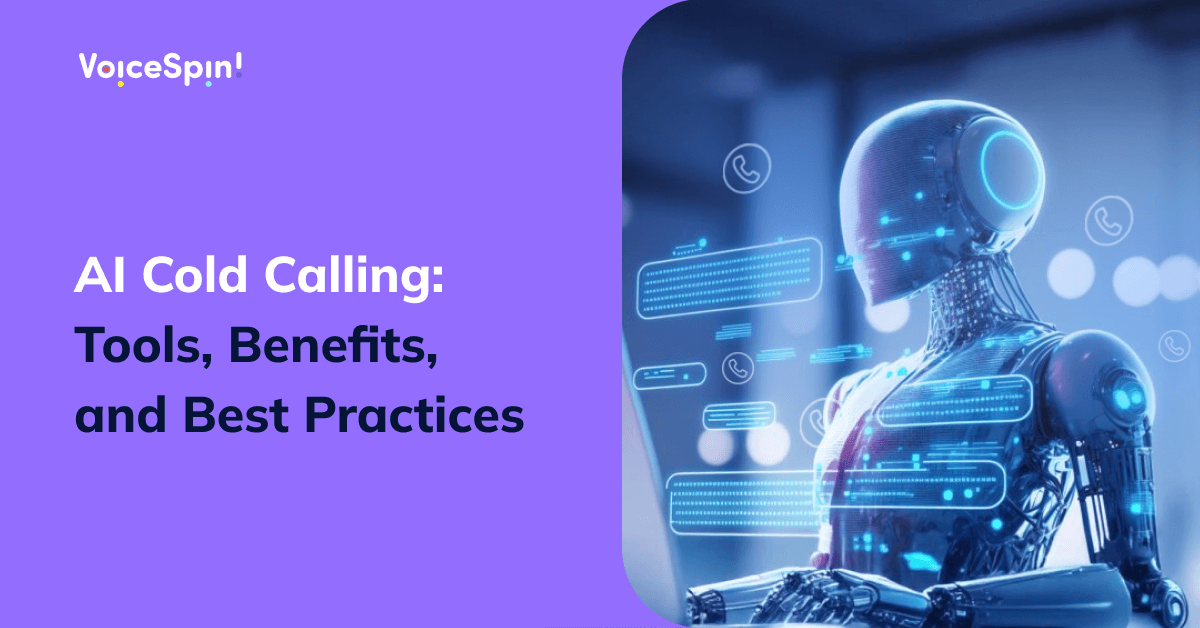VoIP (Voice over Internet Protocol) has been around for over two decades now. Surprisingly, though, many people still think of it as merely a communications technology that is meant to place phone calls over the internet. While it is true (VoIP does enable businesses to make and receive calls over the internet and reduce telecom expenses), today’s VoIP systems can do so much more than that, transforming the entire call center industry.
Artificial Intelligence (AI), in particular, is one of those tech advancements that made VoIP call center systems more sophisticated (read: efficient). In this blog, we’ll look deeper into how integrating AI into a VoIP communication system helps call centers operate more efficiently and, most importantly, serve their customers better.
What is AI VoIP and Why Does it Matter?
AI VoIP is an integration of AI technology into VoIP phone systems. And it truly brings a host of new possibilities for call centers when it comes to handling customer communications – from improved support efficiency, better personalization, and enhanced customer experience to reduced customer support costs and everything in between. At VoiceSpin, we believe that AI is a real game-changer for VoIP communications and the call center industry in general.
AI-powered VoIP systems can intelligently route calls to the best-fitting call center reps, help callers resolve issues independently, automatically analyze voice interactions for QA, customer sentiment, and performance metrics – and the list goes on. To cut a long story short, when VoIP phone systems blend with AI, call centers can streamline customer interactions, reduce the number of manual tasks call center reps have to do, optimize many processes, improve CX, and ultimately save time and money.
Key Capabilities AI Brings to VoIP Services and How Call Centers Benefit from this Synergy
Let’s now get more specific about what new features, tools, and capabilities AI has already brought to VoIP and how exactly call centers benefit from this blend.
1. AI intelligent call routing (predictive call routing)
When customers call a call center for support, they naturally expect two things:
- They want to be connected to the most relevant representative
- They want to get their issue resolved quickly and efficiently
While the second point comes down, more or less, to the training of call center reps, the first one heavily relies on call center technology. This is where AI-powered automated call routing, also referred to as predictive call routing, can make a difference for both callers and agents.
When an incoming call is coming in, AI algorithms analyze multiple variables – such as the caller’s geographic location, previous interactions, and the nature of the inquiry based on the caller’s IVR inputs – to route the call to the best-suited agent or department. And it can also help in call prioritization. For example, urgent customer calls or calls from VIP customers are placed in the front of the call queue to ensure they are connected to call center reps faster and receive priority support.
With intelligent call routing, call centers can eliminate call transfers, reduce handle times, and ultimately improve customer satisfaction. According to Probe CX, implementing predictive call routing enabled the company to reduce the average handling times by 14% and call transfers by 5%.
2. AI Interactive Voice Response (IVR)
Interactive Voice Response (IVR) systems have been a fundamental part of call center operations. Along with call routing, IVR helps call centers route incoming calls even more effectively by capturing each caller’s intent and available customer data. In addition, multi-level IVR self-service menus can help callers receive information and handle certain basic issues (like checking account balances or scheduling appointments) independently without needing to talk to a live agent.
When AI came into the mix, IVR systems have become much more advanced. AI-powered IVR systems help optimize call routing, eliminate call transfers, reduce handle times, improve First Call Resolution (FCR) rates, and enhance customer satisfaction while also enabling you to reduce the number of calls that need to be handled by human reps. Based on McKinsey, next-gen IVR systems can reduce the number of live-agent calls by over 10% and deliver a fivefold improvement in CSAT scores.
Recommended reading: How AI Benefits Customer Service and How it is Used in Contact Centers
3. AI speech recognition, transcription, and call summarization
Another capability that AI brings to VoIP voice communication is speech recognition. In the call center environment, AI speech recognition technology (also known as Automatic Speech Recognition) is used in call/ voicemail transcription and call summarization. It basically converts spoken human speech into written text in real time, making conversations searchable, and summarizes each call. Just think about the efficiency it brings to call centers.
Firstly, call center managers can review transcribed calls or (even better) call summaries to assess the quality of interactions, evaluate agent performance, or just search for specific information without having to listen to the entire call recording. That also provides quick access to past interactions so your reps can easily refer to previous conversations and deliver a more personalized experience to customers.
For example, VoiceSpin’s AI call summarization feature allows you to automatically summarize every inbound or outbound call. And you can set your own specific requirements, literally telling the system what you want to include in each summary, like action items, call purpose, outcome, and more.
4. AI voice bots and virtual assistants
VoIP AI is also implemented in voice bots and virtual voice assistants. Similarly to AI chatbots, AI voice bots and virtual assistants help call centers deliver 24/7 self-service support and improve customer satisfaction. AI voice bots and virtual assistants use speech recognition, Natural Language Processing (NLP), and other AI-powered technologies to engage with customers, answer common questions, and help them resolve basic issues on their own.
And what’s more, beyond answering support questions, AI voice bots can also create revenue growth opportunities for businesses through cross-selling and upselling by offering callers personalized product recommendations based on customer history and previous interactions.
All in all, AI voice bots and virtual assistants enhance VoIP communications in call centers – and their adoption will only continue to grow. According to a report by IndustryARC, the voice bot market size is estimated to reach $98.2 billion by 2027.
5. AI auto dialing
Auto dialers have been essential tools for outbound call center teams, helping them automate the entire process of making outbound phone calls to prospects or customers, eliminating the need for sales reps to dial numbers manually, and saving them a bunch of time and effort. AI made auto dialers a lot more effective, enabling outbound call center teams to make more outbound calls in less time and close more deals.
AI-powered auto dialers, also known as predictive dialers, use AI and ML (Machine Learning) algorithms to ‘predict’ agent availability based on real-time and historical metrics. The system initiates multiple outbound calls per agent simultaneously, even before an agent completes their current interaction, automatically adjusting the dialing rate.
What does it mean in practice? A single agent can handle more outbound calls in less time as there is no idle time between calls, helping you increase the efficiency of your outbound calling campaigns. For high-velocity sales teams, AI predictive dialers can be a real game-changer.
No wonder the global market for predictive dialer software solutions continues to grow at a tremendous rate. According to Verified Market Research, the predictive dialer software market size is projected to reach USD 32.7 Billion by 2030 (from USD 2.7 Billion in 2023), growing at a CAGR of 37.3% during the forecast period 2024-2030.
6. AI speech analytics
The integration of AI VoIP systems with speech analytics solutions can bring additional efficiency and cost-saving to call centers in many ways. Overall, AI speech analytics tools can streamline and automate the entire call quality monitoring process in call centers by monitoring and analyzing 100% of customer calls and eliminating the need for your QA team to do it manually. Managers can then use these insights to ensure compliance, identify agent training gaps, evaluate agent performance, and spot recurring issues.
VoiceSpin’s AI Speech Analyzer is an excellent example. The system monitors your inbound and outbound calls and analyzes voice interactions based on your predefined criteria so you can track what’s important to you. On top of that, you can track particular keywords and phrases and set real-time notifications for managers when they appear in conversations, which is a great way to prevent costly non-compliance issues.
7. AI predictive analytics
By leveraging AI predictive analytics, call centers can improve operational efficiency by miles. For example, think about call center demand forecasting. A VoIP phone system with predictive AI capabilities can predict call volumes at different times of day, week, or month based on historical metrics. That, in turn, can help you optimize staffing levels, ensuring that your call center has enough reps during peak hours to handle the increased call volume effectively without long wait times for your callers.
And not only that – AI predictive analytics can help you identify customers who are most likely to churn so you can act proactively and retain them. You can also better anticipate customer needs and deliver personalized recommendations, improving customer experience.
8. AI sentiment analysis
AI sentiment analysis is another use case for VoIP AI in call centers. Sentiment analysis uses Natural Language Processing and Machine Learning to determine the sentiment of the speaker, which is then categorized as either positive, neutral, or negative. The system does that by analyzing the caller’s tone, intonation, pitch variations, choice of words, loudness, the amount of frustration in a speaker’s voice, and other variables.
How can call centers benefit from tracking customer sentiment in voice interactions? Firstly, along with measuring CSAT and NPS (Net Promoter Score), sentiment analysis gives you a more holistic view of customer satisfaction. Secondly, being able to gauge customer emotions in real time gives reps more context to deliver a more empathetic customer experience.
What’s more, tracking and analyzing customer sentiment enables you to better understand the reasons behind customer dissatisfaction and uncover issues that might otherwise go unnoticed.
9. AI agent assist
AI agent assist solutions can improve VoIP communications in call centers by empowering call center agents with the right knowledge at the right time to serve customers faster and more efficiently. AI agent assist tools are relatively new in the call center industry, but they already proved to be extremely efficient, helping call centers improve the experience for both agents and customers.
An AI agent assist solution retrieves information from existing knowledge centers and systems and automatically provides agents with real-time guidance and recommendations on how to respond to customers right during the interactions. That helps agents navigate each conversation better and resolve issues faster and more efficiently, helping you reduce the Average Handle Time (AHT), improve First Call Resolution (FCR) rates, and increase CSAT scores.
10. AI noise cancellation and accent neutralization
In addition to all of the above, AI can improve voice communications in VoIP phone systems by integrating noise cancellation and accent neutralization technologies in call centers. These solutions, in fact, can greatly improve the experience for both agents and customers.
In most call centers, agents have to work in incredibly busy (and noisy) environments. According to an IRIS research, 84% of the agents surveyed said that background noise has a negative effect on the customer experience they deliver. AI noise cancellation solutions can help call centers reduce background noise in real time, improve call quality, and increase CSAT scores.
Similarly, accent correction software solutions can neutralize accents in real time and help reduce misunderstandings in communication between your reps and customers. This is particularly helpful in international call centers where agents and customers may come from different linguistic backgrounds.
How AI is Implemented in VoiceSpin’s Contact Center Software Solutions
At VoiceSpin, we’ve always been at the front of the AI transformation in the call center industry. That’s why we’ve built a range of AI-powered contact center solutions and tools to help customer service and sales teams optimize processes, streamline operations, and improve efficiency. Some of our key AI-driven solutions and capabilities include:

- AI Call Summarization: AI call summaries give you quick insights into conversations between your customers and agents. By summarizing every call, you can save your QA team hours of manual work, freeing their time to focus on higher-value, revenue-generating tasks.
- AI Speech Analyzer: Our AI Speech Analyzer allows you to monitor 100% of your inbound and outbound calls in real time to streamline your call center quality monitoring, stay on top of your team’s performance, and prevent non-compliance issues by spotting specific keywords and phrases.
- AI Messaging: With AI Messaging, you can integrate multiple digital communication channels (including email, live chat, social media, and WhatsApp) under one roof and manage customer interactions across all these channels from a single inbox, delivering a seamless omnichannel CX.
- AI Chatbots: Set up and train an AI chatbot to reduce your inbound call volume and the load on your customer support team by enabling your customers to receive self-service support 24/7 and get instant answers to their questions even when your reps are not available.
- AI Predictive Dialer: Our AI predictive dialer uses AI and Machine Learning to intelligently score and prioritize leads and connect them to the best-suited sales reps based on the probability of a successful conversion to help you maximize the efficiency of your outbound calling efforts.
Want to learn more about VoiceSpin’s AI contact center software solutions and how they can help your business improve customer experience and boost your team’s productivity? Book a demo call now.





 +18889082995
+18889082995
 +442036084160
+442036084160
 +97237237006
+97237237006